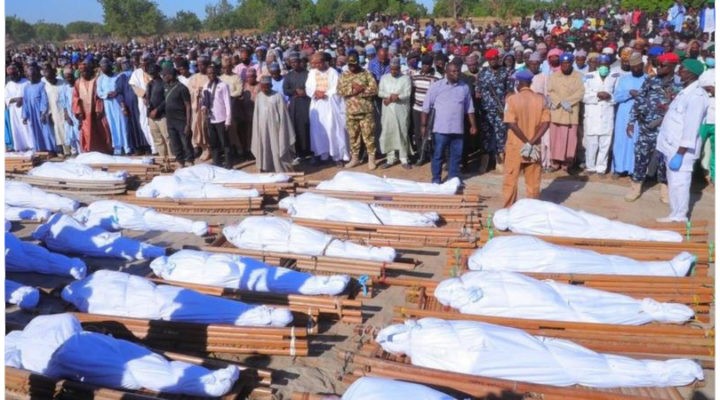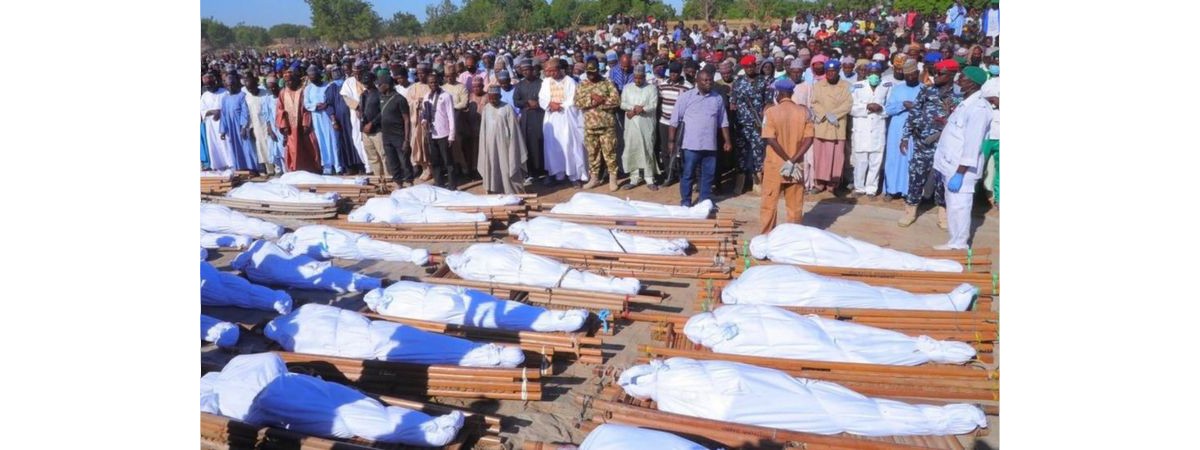Over the past several months, two Christian NGOs — Open Doors and the Voice of the Martyrs — have been persistent in their claims about religious violence in Nigeria. Both organizations believe the many acts of terror recorded in the country are the handiwork of Islamic terrorists out to eliminate Christians and achieve an Islamic agenda.
But even more instructive is their alarming claims.
Open Doors, for instance, believes Nigeria is the worst place in the world to be a Christian. In the aftermath of a June 5 terror attack on St. Francis Catholic Church in Owo in Nigeria’s Ondo State, Lindy Lowry, managing editor of Open Doors USA, wrote: “I’ve told you before that, according to our research for the World Watch List, Nigeria is the deadliest country for Christians — on average, every two hours, a Nigerian Christian dies for their faith. A heinous attack like this one reinforces that truth.”
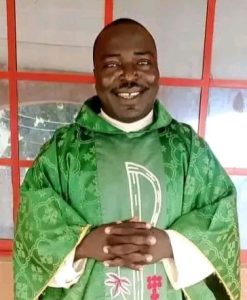
John Mark Chietnum
Then on July 24, days after John Mark Chietnum, a Catholic priest in Kafanchan in Nigeria’s Kaduna State, was abducted and murdered by unknown persons, Lowry stated: “This year alone, four of the 20 kidnapped Nigerian church leaders have been killed in captivity. … Violence against Christians in Nigeria is escalating exponentially. Just six months into this year, the country is on track to exceed last year’s death toll — already the world’s highest.”
Open Doors then went on to share stories of 10 martyrs — which Lowry said represent “just a fraction of tens of thousands of Nigerian Christians” who have lost their lives to religious extremism in Nigeria.
Voice of the Martyrs also holds similar strong views about religious violence in Nigeria. In a post on the country this month, the organization named two groups as responsible for the frequent violence in the country: “Persecution is a daily reality for many Christians in Nigeria. Fulani Islamic militants routinely target Christian communities in the central region of the country, burning homes, destroying churches, displacing families and leaving many Christians without spouses, parents and children,” it said. “And in the north, Boko Haram carries out devastating attacks against Christians in its campaign to establish an Islamist caliphate governed by Islamic law.”
It’s not just Open Doors and Voice of the Martyrs that make such claims, however. The InterSociety, a human rights body in Nigeria, also insists that the Christian population in Nigeria, has, over the years, borne the brunt of Islamic fundamentalism.
A July 4, 2022, report by the agency states that between January and June this year, “no fewer than 2,543 Christians were hacked to death or killed by the Nigerian Islamic jihadists propagating radical Islamism.”
“No fewer than 2,543 Christians were hacked to death or killed by the Nigerian Islamic jihadists propagating radical Islamism.”
Apart from Islamic elements, the report also points an accusing finger at security forces as accomplices in the killings, saying they have engaged in “witch-hunting” operations that lead to “indiscriminate killing of defenseless civilian Christians … on the grounds of their ethnicity and religion.”
What’s the real story?
While no one cognizant of the situation in Nigeria denies violence has increased, close observers believe the alarming cries of some evangelical Christian groups are vastly overstated and often place blame without evidence. And they believe Christians are not alone in facing death and danger in Nigeria today.
To get to the real story, begin with an understanding of the country’s composition and geography.
Located in the western sphere of Africa, Nigeria is a multi-ethnic and linguistically diverse society inhabited by more than 200 million people. Islam and Christianity are the two dominant religions. Formerly a British territory, the country is bordered on the west by Benin, on the south by the Gulf of Guinea, on the east by Cameroon and Chad, and on the north by Niger.
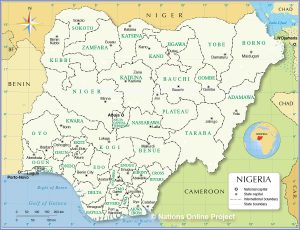
Given its diversity, the struggle for positions and political power among its disparate tribes since the country gained independence from Britain in 1960 is common. And with that comes cries of marginalization by those who lose out or feel shortchanged.
Of the more than 250 ethnic groups that make up the country, only three — the Hausa Fulani, Yoruba and Igbo, which boast the largest populations — have dominated power, consistently producing the president or head of state as military or civilian leader. The only exceptions to the rule were when a few northern military men from minority tribes became head of state and when Goodluck Jonathan, from a minority Ijaw tribe in the Niger Delta region, accidentally became president after the death of Umaru Yar’Adua, a Fulani, in 2010.
In the quest for relevance in the geographical space called Nigeria, religion often gets deployed as a tool. As does class.
Farmer-herder clashes
Aside from the quest for political dominance, one major cause of conflict in recent years is grazing land. It accounts for many of the deaths associated with farmer-herder clashes within the northern and southern regions of the country, involving the mainly Fulani herdsmen, a majority of whom are Muslims, and the farmers, most of whom are Christians.
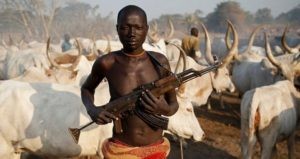
A Fulani herdsman in Nigeria
Because the country’s borders with its neighbors are porous, herdsmen from different parts of Africa have unfettered access to the country in search of grazing routes. This reality has sparked fears in some quarters that terrorist groups like Boko Haram and Al-Qaeda have infiltrated the ranks of herdsmen to wage a religious war.
In his book The Will to See, Bernard-Henri Levy, a French writer and documentarian who travelled to Nigeria a few years ago, recounts his experience: “I realize that this is a real true war being carried out by the Fulani. In it I see an enlarged Boko Haram. An extended, rampant Boko Haram. … But the Fulani, let us be clear, do not have borders. They are Boko Haram no longer confined to a bastion equal to 4% to 5% of Nigerian territory. The Fulani represent the savagery of Boko Haram extended to all of the unbelievers, Christian and Muslim alike, of Nigeria, Chad, Niger, Cameroon and beyond.” What is happening in Nigeria, Levy states, is “slow-motion war, horrific in its cruelty, with a large and mounting number of victims killed or displaced. It’s a massacre of Christians on a scale that appears to exceed even what the Christians of the Middle East have undergone.”
That’s a view that Luka Binniyat, national spokesman of Southern Kaduna People’s Union, would agree with. Binniyat believes to reduce what is happening in Nigeria to a clash between herder and farmers is to make light of a grievous matter. To him, the appropriate word to use is “genocide.”
Christianity, he said, is “targeted for extreme violence” in Southern Kaduna and the Middle Belt of Nigeria. In Southern Kaduna, he emphasized, “Not less than 560 churches have been burned since 2015 and 200 Christian clergy killed. The number of Christian clerics and their family members kidnapped since 2016 are over 1,300.”
As a result of this violence, “Christians have to evacuate from their native lands” into camps for internally displaced persons, he asserted, and the number of displaced persons in Southern Kaduna is more than 500,000.
Binniyat claims government officials are colluding with armed Fulani herdsmen and allied jihad groups.
Victims on all sides
Among the accused there is a different perspective. Salim Musa Umar is a Fulani who resides in Plateau State. He says it’s worrying to be viewed in the way his people are described by Christian groups in Nigeria.
“As a Fulani man, I am worried about the activities of some criminals among our youth perpetrating crimes in many parts of the country,” he said. “But one thing is clear: They do not represent the Fulani ethnic group. They are criminals and their activities (affect) the peaceful Fulanis themselves.”
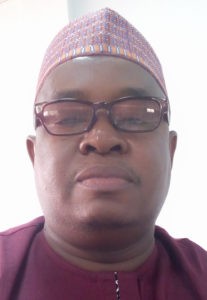
Salim Musa Umar
While there are some violent Fulanis, there also are many peace-loving Fulanis who do not share an extreme ideology — a fact acknowledged even by Voice of the Martyrs.
Umar says the reports of organizations like Open Doors are “exaggerated.” As far as he is concerned, no religious or ethnic group is free from the activities of terrorists.
“There are criminal elements operating in the open spaces in the name of banditry or kidnappings for ransoms, and there are those that are affiliated to ideological groups like Ansaru, ISWAP and Boko Haram that are perpetrating heinous crimes against humanity targeting places of worship (churches and mosques) maiming and killing persons,” he explained. “They hardly choose their targets as both (Christian and Muslim) adherents are victims. Empirical evidence is available everywhere to support the submission that both Christians and Muslims are victims of these (acts of terror).”
However, attacks on Christians are more talked about because of the attention generated in news media, he asserted. “The Christian perspective is more pronounced because they have media sympathy as well as foreign agencies that support such assertions without taking the pain to investigate properly.
In reality, “victims of attacks vary in terms of numbers depending on who and where is attacked,” he said. “For example, in Southern Kaduna, Benue and Plateau majority of the inhabitants are Christians, thus, it is normal for the victims to be from one side while in Niger, Zamfara, Katsina, Borno and the other parts of Kaduna State where majority of the inhabitants are Muslims, the victims were all Muslims.”
Beyond that, Umar said some of the heinous crimes committed in many parts of the country in the name of Fulani herdsmen were not perpetrated by them. “’Fulani herdsmen’ is an effective cover for all sort of criminals in the country now. The recent Owo Church attack where over 40 innocent worshippers were killed was instantly linked to the Fulani herdsmen until last week when the real perpetrators were arrested. None of them turns out to be a Fulani! So many examples are in the public domain on this.”
The Muslim Rights Council also believes the casualty figures associated with Christians in Nigeria are hyped above those of Muslims.
About 32,000 Muslims were listed by MURIC to have been killed by terrorists within three years in Nigeria
In a report published by the Guardian Nigeria, Ishaq Akintola, MURIC’s director, said when an assessment of the casualty figure is collated, the facts show that more Muslims have suffered from religious violence than Christians. About 32,000 Muslims were listed by MURIC to have been killed by terrorists within three years in Nigeria.
Akintola accused the Christian Association of Nigeria of misrepresenting facts in their presentations to U.S. authorities, leading to five U.S. senators — Josh Hawley, Marco Rubio, Mike Braun, James Inhofe, Tom Cotton — writing a letter to U.S. Secretary of State Antony Blinkin to request that Nigeria be put back on the State Department’s list of Countries of Particular Concern.
Their letter states in part: “Religious violence and intolerance directed toward Nigerian Christians have worsened in recent years. One report documented more than 4,650 cases of Nigerian Christians who were killed for their faith in 2021. Accordingly, Nigeria earns the dubious honor — for the second consecutive year — of being the deadliest country on earth for Christians.”
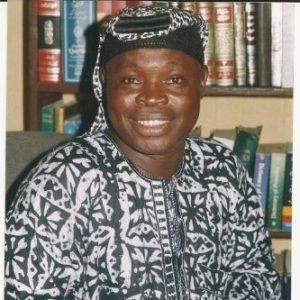
Ishaq Akintola
But Akintola of the Muslim Rights Council disagrees. “Boko Haram in particular has killed, maimed and displaced more Muslims than Christians; more Muslim clerics and more Muslim traditional rulers have been killed or kidnapped than Christians,” he said.
“Most importantly, more Muslim majority states are under siege by these terrorists than Christian majority states, while more Nigerian Muslims have been impoverished by insecurity than Christians. Insecurity in Nigeria has had greater impact on Muslims more than Christians, but our Christian neighbors are standing history on its head.”
Contrary to the religious persecution Christian sympathizers cite, Akintola said Muslims in the majority Christian part of southern Nigeria are the main victims of injustice.
“To claim that the Nigerian government is failing to protect the religious freedom of its Christian citizens is a shameless attempt to upturn the facts of history,” he said. “Millions of Muslims live under duress, intimidation and harassment in Southern Nigeria where Christian governors and government officials openly dehumanize Muslims and deprive them of their Allah-given fundamental human rights.
“To claim that the Nigerian government is failing to protect the religious freedom of its Christian citizens is a shameless attempt to upturn the facts of history.”
“Female Muslim students are locked out of schools merely for manifesting their Islamic faith by using hijab. Imminently qualified Muslims are denied employment unless they convert to Christianity. Political appointments are anathema for Muslims in Southern Nigeria under Christian governors.”
Further, “only one state has a Muslim governor out of the 17 states in Southern Nigeria, and Muslims live under religious apartheid in all the 16 states controlled by Christians. So, which government are the U.S. senators referring to as violators of religious freedom? We assume that a critical, holistic and comprehensive assessment will be objective here. Selective appraisal will do justice and fairness no good.”
Bridging religious divisions
To restore confidence in one another in a pluralistic society like Nigeria, Umar, the Fulani, believes people of all faiths need to eschew bitterness and tolerate their differences and religious leaders should work on uniting people.
“We are truly doing a lot of disservice to ourselves with religion,” he declared. “We are doing everything to further exacerbate the (fault lines) between us. Every issue is viewed from the prism of religious lens. Religious leaders especially in Nigeria are more concerned with what is happening in the political terrain than adhering to the teachings of their religion. It makes everything difficult for us to live in peace with one another.
“It is either you are for us or against us. The principles of humanity are jettisoned pursuing personal aggrandizement in the name of religion. My advice is simple: Let’s adhere to the true teachings of our religions as revealed in the holy books, respect our individual differences and know that we don’t have any country outside our own. It is for us to make or mar it.”
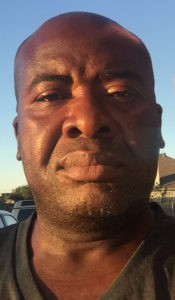 Anthony Akaeze is a Nigerian-born freelance journalist who lives in Houston. He covers Africa for BNG.
Anthony Akaeze is a Nigerian-born freelance journalist who lives in Houston. He covers Africa for BNG.
Related articles:
The struggle to rotate presidential power between Christians and Muslims in Nigeria
Tragic church attack in Nigeria claims more than 50 lives on Pentecost
Fact-finders highlight ethno-religious violence in Nigeria, while State Department declines to act

